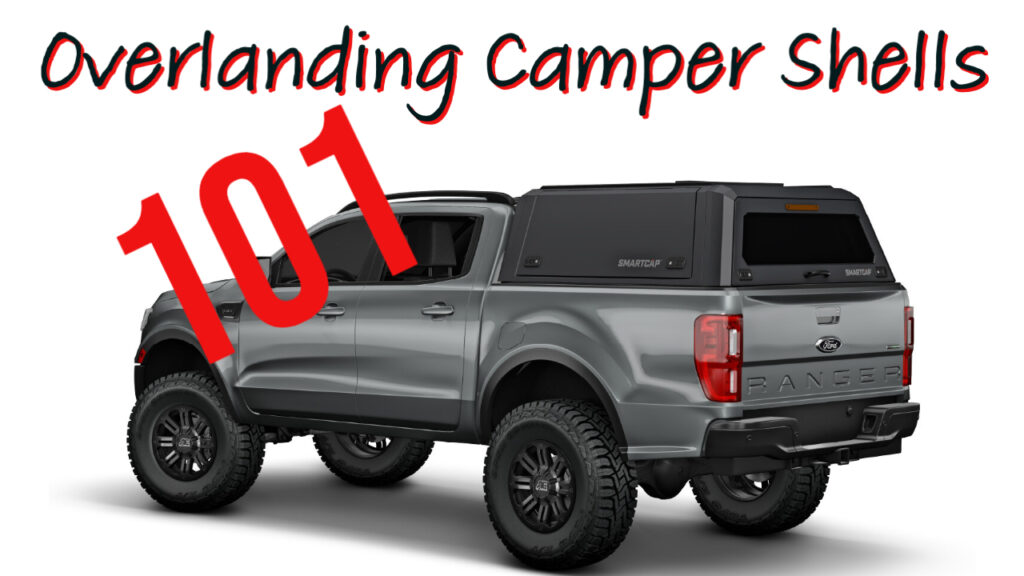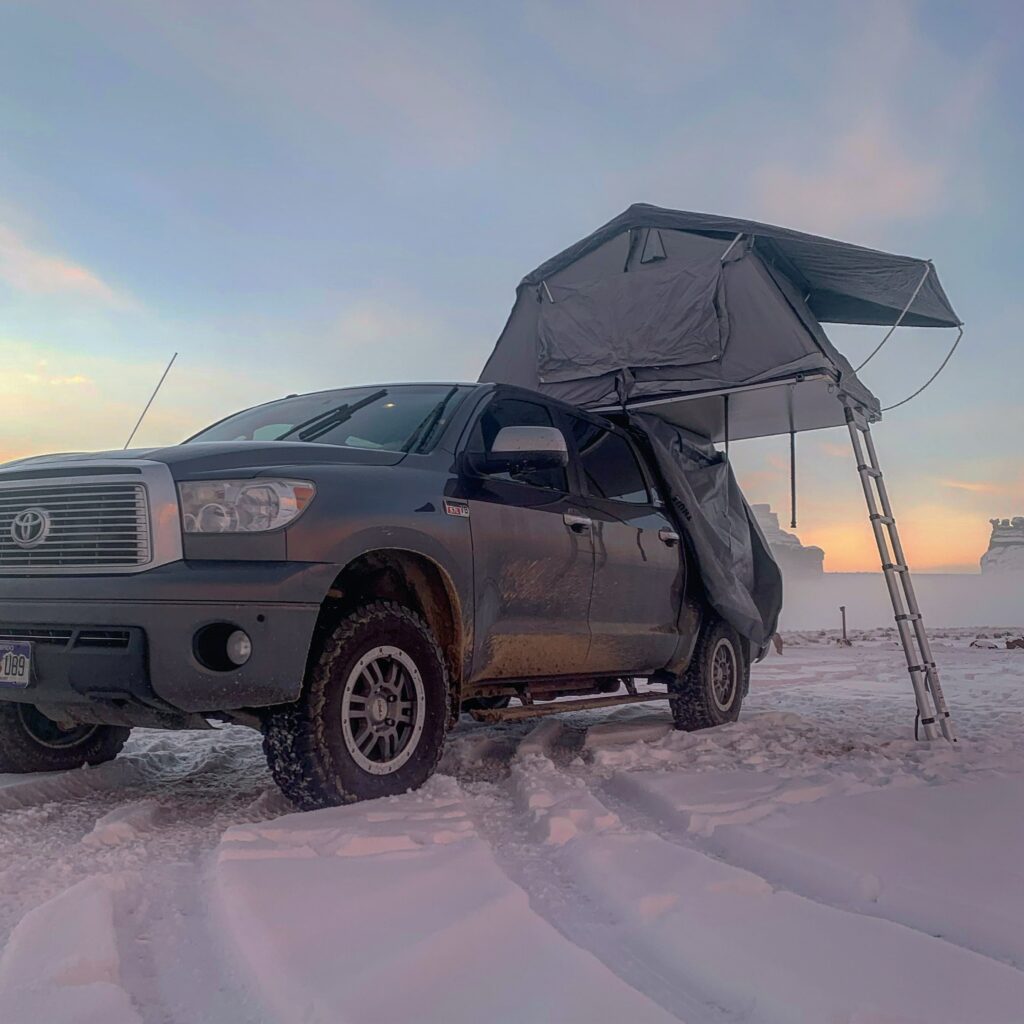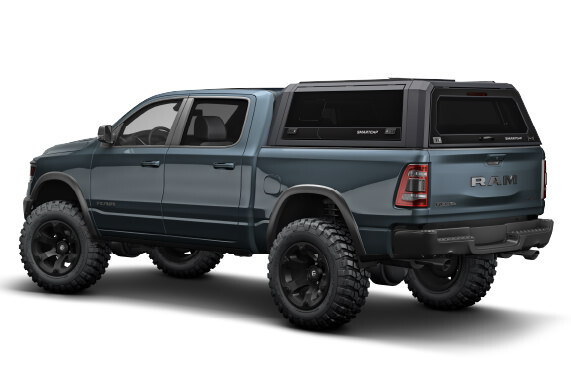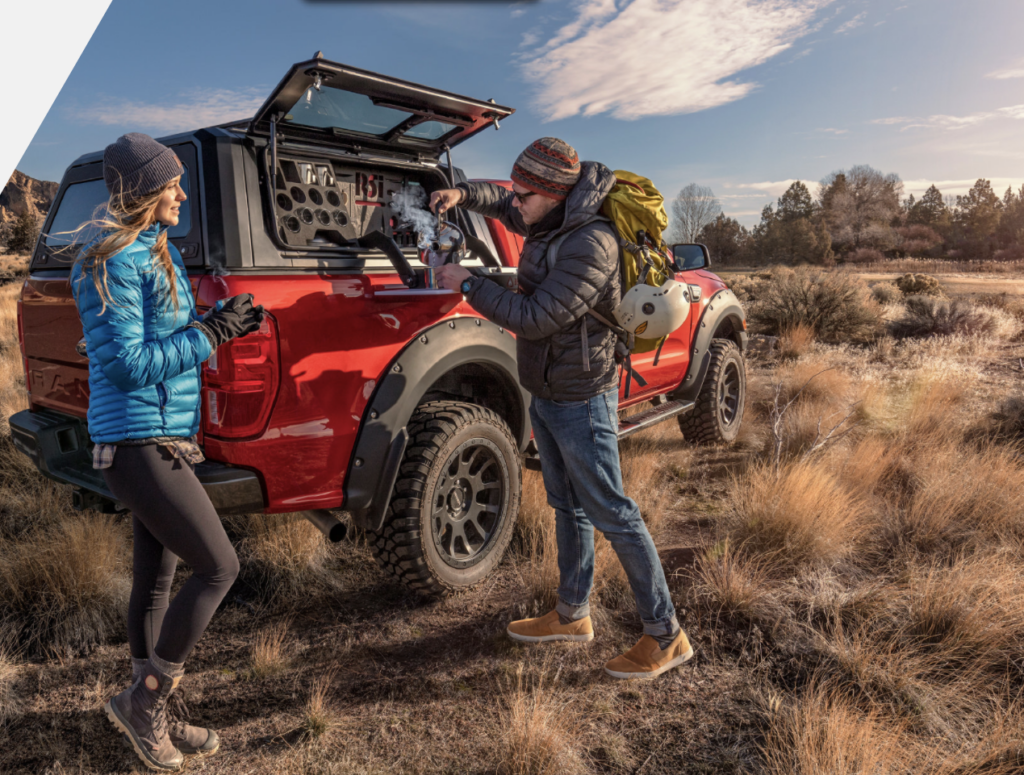Overlanding starts with self-reliant vehicle exploration and outfitting your overlanding gear usually also starts with the vehicle you have.
If you have a truck and you love overlanding, you have likely considered a camper shell for your overlanding sleeping and storage options.
But, which camper shell should you even consider, after all they are all the same right? Nope, and the one you select will drastically impact your overlanding experience as well and the safety of your trip and equipment.
So, let’s chat about how to select a camper shell for overlanding and consider the best option for overlanding camper shells.

Camper Shell vs Truck Bad Rack System For Overlanding
So, here’s the deal, you have a few options for truck overlanding and sleeping. Sure, you can go with a ground tent (and I have before) but it has its downfalls.
Ground tents are slow to set up and take-down, as well as they keep you on the ground and allow water, bugs and predators access to your peaceful sleeping quarters, not my favorite.
The two sleep option kings in truck overlanding would be either a truck bed rack system with a RTT mounted, or, a camper shell where you can either sleep inside the camper shell or also mount a roof top tent on the top.
???? If you haven’t read it yet, NOW is the time to read up on our guide to choosing between a RTT and a CamperShell For Truck Bed Camping.
Downside of Truck Bed Racks
The downsides of a truck bed rack system start with gear storage. While you can store your gear inside your truck, that can be a pain if you have friends or family with you.
That leaves you in a position to then put your gear in the bed of the truck under the rack leaving it open to theft, or weather as it’s not secured and out in the open.
Downside of Camper Shells

Most modern camper shells are of fiberglass construction and leave your camper shell vulnerable to cracking and breaking under a heavy load (like a roof top tent).
While the vehicle may handle the weight fine when stationary, it may break when the vehicle is moving and traversing off-road trails.
A few hundred pounds on top of a moving truck and swaying weight with offroading could lead you to a really bad situation far from home with a broken camper shell.
Additionally, while a camper shell is not permanent, it’s quite the beast to remove and replace as needed.
It usually requires a buddy to help lift it and a large place to store it. For most, once you install the camper shell, it stays for good because of these reasons.
What’s the Best Option?
We all know this answer “the best is what works best for you”. I know you hate hearing that but it’s true. Now, don’t get me wrong, in my op[tion there is a better option.
Cj and I have done both currently, he has a Yakima Bed Rack System with a FSR Roof Top Tent mounted. I have a Snugtop fiberglass camper shell with Thule bars and Thule Tepui Roof Top Tent.
We camp together all the time, on solo trips and with family and have a few things to share that may help you make a choice.
After a chat, if we both did it over again, we would go with a camper shell.
Mostly due to the fact that overlanding gear is expensive, and the thought of gear being stolen at a gas station or ruined with unexpected weather, and the fact that you can stealth camp inside your camper shell in a pinch, make the camper shell our go-to option.
But, what about the issue of the fiberglass camper shell breaking under dynamic weight loads? That’s a fair question and a big issue for many.
Until recently! The folks at RSI make a new modular camper shell called the RSI Smart Cap and it’s awesome!
???? Looking to learn it all on truck bed camping? Check out our Free Guide to Truck Bed Camping!
Best Camper Shell For Overlanding

The folks over at RSI boast their Smart Cap as the world’s first stainless steel truck cap system. Its 5-piece truck canopy design allows you to customize your truck’s camper shell.
What is the deal that makes that great? Well, stainless steel is far superior to fiberglass when it comes to durability and weight load management.
According to RSI, the dynamic (vehicle in motion) weight capacity of the RSI Smart Cap is 330lbs making it perfect to support a roof top tent as most weigh around 130-170lbs.

The Dynamic (vehicle NOT in motion) weight capacity is a whopping 770lbs! Think about it, let’s say you are 200lbs and you have your friend and dog with you, that’s plenty of weight capacity left over.
Should you like your overlanding camper shell to have options, the RSI Smart Cap has them all, from a 5-piece modular design, to MOLLE Gear Placement systems, and optional integrated camp kitchens, the RSI Smart Cap is a Overlanders dream.
Another cool feature is the positive airflow system. This keeps, well, positive airflow, inside your camper shell, meaning the dust stays on the trail and not splattered all over your gear.
Built-in roof rails come standard as well, no upfitting needed for your existing racks.
Best of all, the RSI Smart Cap comes only in one color, matte black, meaning you can literally order this direct from RSI to your door.
No waiting on a factory color match and in my opinion, matte black always compliments trucks well.
If you are really feeling like spending, check out RSI’s Bed Replacement system, a modular bed system that lets you do it all, well, depending on your wallet size.
Speaking of, the RSi Smart Cap will set you back $3,295 for Mid-size pickups like Tacomas and Gladiators, and $3,895 for full-size options for Rams, Silverados and F-150’s.
At first that may seem like a lot, but once you realize a new fiberglass cap runs nearly $3,000, it turns out it’s not that bad, but actually way more durable for the money.

Final Word On Overland Camper Shells
As you can see, you have some options when it comes to truck overlanding and camper shells.
If you don’t need to mount a roof top tent on your truck camper shell, you can safely go with a fiberglass shell and sleep inside your truck bed.
However, if you want a RTT on your camper shell, you can’t beat the tough RSI Smart Cap and its impressive 770lb static weight capacity.
Most options will still run you around $3,000-$4,000 , so get what you need, get it done right the first time and go get outside! I’ll See you on the trail, Mike.
